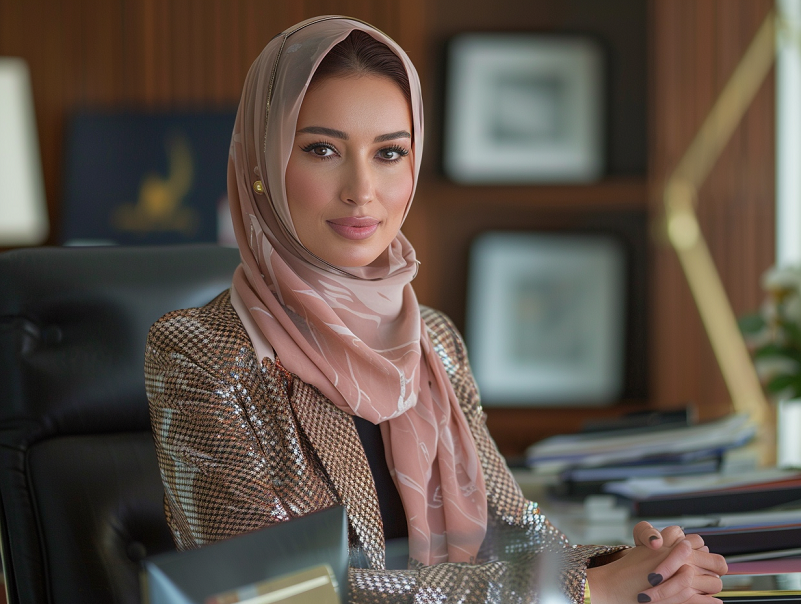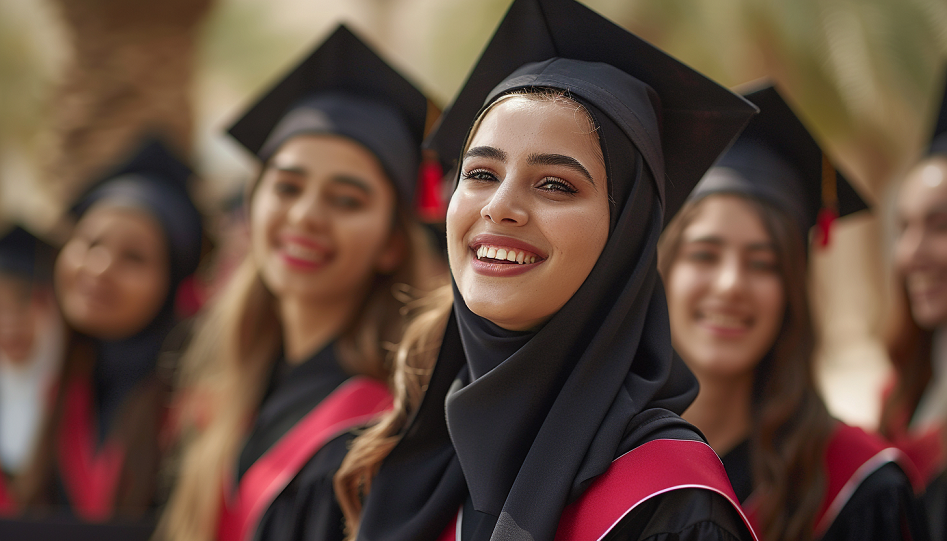The Kingdom of Bahrain stands as a beacon of progress and tradition in the realm of women’s rights. Bahrain, a nation that has embraced the future while holding onto its rich past, showcases a unique journey towards gender equality. The narrative of this movement is punctuated by landmark legislations, influential figures such as Hala Mohammed Jaber Al Ansari and Mona Almoayyed, and pivotal moments like the ratification of the Convention on the Elimination of All Forms of Discrimination against Women (CEDAW) in 2002. Through an exploration of Bahrain’s legislative reforms, societal changes, and the enduring hurdles, this essay aims to provide a comprehensive overview of the strides made and the strides yet to be taken in the pursuit of women’s rights.
Historical Background
The Women’s Rights Movement in Bahrain, like many of its counterparts globally, did not emerge in a vacuum but was the result of years of evolving social consciousness and activism. The genesis of this movement can be traced back to the establishment of the first women’s charity in 1965, laying the groundwork for a more structured approach to women’s rights. This early initiative was crucial in mobilizing women and raising awareness about the need for gender equality and social reforms.
The constitutional reform of 2001 marked a watershed moment for Bahraini women, granting them the right to vote and stand in national elections for the first time. This historic amendment was not merely a legal formality but a significant step forward in the political empowerment of women, signaling the state’s acknowledgment of women’s roles as equal citizens in the democratic process. The following year, 2002, further cemented this commitment when Bahrain ratified the Convention on the Elimination of All Forms of Discrimination against Women (CEDAW), aligning itself with international standards for women’s rights and setting the stage for subsequent reforms.
These foundational years were pivotal in shaping the trajectory of the women’s rights movement in Bahrain, demonstrating a growing recognition of women’s rights as an integral component of the nation’s progress and development. The movement’s early days were characterized by a focus on legal and political rights, laying the groundwork for broader societal changes in the years to come.
Legal Advancements
The journey towards gender equality in Bahrain has been marked by significant legal advancements that have fundamentally altered the landscape of women’s rights. Among the most notable is the introduction of the Family Law (Personal Status Law) in 2002. This groundbreaking legislation provided women with explicit rights in matters of marriage, divorce, child custody, and inheritance for the first time in Bahrain’s history. The law was a monumental step towards ensuring that women’s rights were protected under the legal system, offering a framework for fairer treatment and justice.
The establishment of the Supreme Council for Women in 2001 by King Hamad bin Isa Al Khalifa represented another critical milestone in the legal advancement of women’s rights. This governmental body was tasked with empowering women and ensuring their rights were upheld across all sectors of Bahraini society. The Council’s efforts have been instrumental in proposing and advocating for legal reforms, conducting research, and implementing initiatives aimed at enhancing the status of women in Bahrain.
These legal reforms have not only improved the legal status of women but have also contributed to changing societal perceptions and attitudes towards women’s roles in Bahraini society. The enactment of the Family Law and the establishment of the Supreme Council for Women underscore Bahrain’s commitment to creating a legal and institutional framework that supports gender equality and women’s empowerment. Through these legal advancements, Bahrain has set a precedent in the Gulf region for incorporating women’s rights into its national development agenda.

Societal and Economic Participation
The societal and economic participation of women in Bahrain has seen remarkable progress, thanks to concerted efforts by the government and civil society. Women’s increasing involvement in the workforce and economic contributions have significantly altered the socio-economic fabric of the country. According to the Bahrain Economic Development Board, the labour force participation rate for women has seen a steady increase, demonstrating the growing economic empowerment of women in the kingdom. This shift is not merely quantitative but reflects deeper changes in societal attitudes towards women’s roles in economic development.
Education has played a pivotal role in this transformation. Initiatives such as the UNESCO Literacy Program have dramatically reduced female illiteracy rates, paving the way for greater educational achievements among women. As a result, Bahraini women today are not only more educated but also more visible in various sectors of the economy, from business and commerce to science and technology. The government’s investment in women’s education has yielded dividends, with women achieving higher levels of education and contributing more significantly to the nation’s economic growth.
The economic participation of women in Bahraini society is a testament to the country’s evolving perspectives on gender roles. Women like Mona Almoayyed, managing director of Y.K. Almoayyed & Sons, exemplify the changing landscape, where women are leading major companies and playing crucial roles in the economic sphere. This shift towards greater economic participation of women is a crucial achievement of the women’s rights movement in Bahrain, reflecting a broader trend towards gender equality and empowerment in the region.
International Influence
Bahrain’s efforts to advance women’s rights have not gone unnoticed on the international stage, reflecting a commitment to aligning its policies with global standards for gender equality. The kingdom’s ratification of the Convention on the Elimination of All Forms of Discrimination against Women (CEDAW) in 2002 marked a significant step towards integrating international norms into its legal framework. This adherence to CEDAW has subjected Bahrain to periodic reviews by the committee, providing a platform for international scrutiny and recommendations that have influenced domestic policy reforms and initiatives.
Moreover, Bahrain’s impact on Middle Eastern feminism and its role within the Gulf Cooperation Council (GCC) countries showcases its pioneering approach to women’s rights. For instance, Bahrain’s early adoption of policies promoting women in leadership roles contrasts with the slower pace of similar reforms in some neighbouring countries. The appointment of Hala Mohammed Jaber Al Ansari as the Secretary-General of the Supreme Council for Women exemplifies Bahrain’s commitment to women’s leadership at both national and regional levels.
The kingdom’s engagement with international organizations and adherence to global conventions have played a crucial role in shaping its women’s rights movement. These interactions have not only facilitated legal and policy reforms but have also helped to elevate the status of Bahraini women, inspiring similar movements across the Middle East. Bahrain’s approach to women’s rights, therefore, serves as a case study in how international influence can catalyse domestic change, leading to significant achievements in the realm of gender equality.
Cultural Challenges
Despite significant achievements, the Women’s Rights Movement in Bahrain faces cultural challenges that stem from traditional norms and societal resistance. These obstacles are deeply rooted in the historical and social fabric of the country, often clashing with progressive legal reforms and initiatives aimed at promoting gender equality. The introduction of the Family Law (Personal Status Law) in 2005, for example, sparked considerable backlash from conservative segments of society. This resistance highlighted the tension between advancing women’s rights and preserving traditional values, underscoring the complexity of societal change in Bahrain.
Religious interpretations play a significant role in shaping attitudes towards women’s rights, particularly in matters related to family law and personal status. The debate over the codification of family law has been a contentious issue, with resistance primarily from religious leaders who fear that such reforms could undermine Islamic principles. This resistance was evident in the opposition to the 2017 amendment to the Personal Status Law, which sought to provide women with greater rights and protections. The amendment faced significant pushback from Shia clerics, who argued that it contravened Islamic law, illustrating the challenges of reconciling religious beliefs with the pursuit of gender equality.
These cultural challenges highlight the multifaceted nature of the obstacles facing the Women’s Rights Movement in Bahrain. While legal advancements have been significant, societal and religious resistance continues to pose substantial barriers to full gender equality. Overcoming these obstacles requires a nuanced approach that respects Bahrain’s cultural and religious heritage while advocating for the rights and empowerment of women.

Comparison and Contextual Challenges
The journey of women’s rights in Bahrain, when compared with other Gulf Cooperation Council (GCC) countries, showcases a distinct path marked by early reforms and initiatives aimed at empowering women. However, this progress is not without its contextual challenges. Bahrain’s achievements, such as the election of the first female speaker of the House of Representatives, Fawzia Zainal, in 2018, underscore its leadership role in promoting women in politics within the GCC. Yet, the comparison also reveals persistent obstacles, such as the gender wage gap and underrepresentation in certain sectors, which Bahrain shares with its neighbours.
The GCC context provides both a benchmark for progress and a reminder of the shared cultural and legislative hurdles facing women across the region. Despite being a pioneer in many aspects of women’s rights, Bahrain faces challenges similar to those in the United Arab Emirates (UAE) and Saudi Arabia, including societal attitudes towards women’s roles and participation in the workforce. These challenges are compounded by regional norms and expectations, making the pursuit of gender equality a complex endeavour.
Specific obstacles, such as the underrepresentation of women in STEM (Science, Technology, Engineering, and Mathematics) fields and the persistent wage gap, highlight areas where further progress is needed. While Bahrain has made strides in increasing women’s economic participation, disparities in employment and remuneration underscore the need for targeted policies and initiatives to address these gaps.
The comparison with GCC countries not only highlights Bahrain’s achievements but also underscores the common challenges that need to be addressed to advance women’s rights further. The contextual challenges within the GCC region emphasize the importance of tailored approaches that consider cultural, economic, and legislative factors in the pursuit of gender equality.
Successful Women Leaders
The narrative of women’s empowerment in Bahrain is enriched by the stories of successful women leaders who have broken barriers and set new precedents in their respective fields. One such inspirational figure is Mona Almoayyed, the managing director of Y.K. Almoayyed & Sons, a leading business conglomerate in Bahrain. Her leadership and achievements in a traditionally male-dominated industry exemplify the changing dynamics of women’s participation in the Bahraini economy. Almoayyed’s success is not just a personal triumph but a testament to the potential of Bahraini women to lead and excel in the business sector.
Activists’ Contributions
The progress in women’s rights in Bahrain has also been significantly influenced by the relentless efforts of activists who have advocated for gender equality and legal reforms. Ghada Jamsheer, a prominent women’s rights activist, has been at the forefront of the fight for women’s legal rights, particularly in matters of personal status and family law. Jamsheer’s activism, marked by her leadership in the Women’s Petition Committee, has brought international attention to the challenges faced by Bahraini women. Her designation as one of the “World’s 100 Most Powerful Arab Women” by Arabian Business highlights the impact of her work in advancing women’s rights in Bahrain and beyond.
These case studies of Mona Almoayyed and Ghada Jamsheer illuminate the diverse pathways through which women in Bahrain are making significant strides, whether in the sphere of business or through activism. Their stories underscore the progress achieved while reminding us of the ongoing challenges that women face in asserting their rights and achieving full equality.

Future Prospects and Recommendations
The future of gender equality in Bahrain looks promising, with ongoing initiatives and a clear commitment from both the government and civil society to advance women’s rights. The National Plan for the Advancement of Bahraini Women (2013-2022) represents a strategic framework aimed at enhancing women’s economic, political, and social empowerment. This plan, alongside continued legal reforms and educational initiatives, sets the stage for further progress in the coming years.
To overcome existing obstacles and strengthen the women’s rights movement in Bahrain, several recommendations are proposed. Firstly, there is a need for continued legal reforms, particularly in areas where women are still underrepresented or face systemic barriers. This includes amendments to family law and increasing women’s participation in STEM fields. Secondly, societal engagement through awareness campaigns and educational programs can help shift traditional perceptions of gender roles, fostering a more inclusive environment for women’s empowerment.
Furthermore, the success of these efforts requires collaboration between the government, private sector, and civil society organisations. By working together, these stakeholders can ensure that policies and initiatives are effectively implemented and that the benefits of gender equality are widely understood and embraced.
The Women’s Rights Movement in Bahrain has traversed a commendable journey from its inception to the present day, marked by significant legal advancements, societal shifts, and the challenging yet persistent efforts of activists and leaders. As Bahrain moves forward, the continued commitment to empowering women will not only enhance their rights but also contribute to the nation’s development and prosperity. The journey of the Women’s Rights Movement in Bahrain is a testament to the resilience and determination of its people, offering valuable lessons and inspiration for the global pursuit of gender equality.

